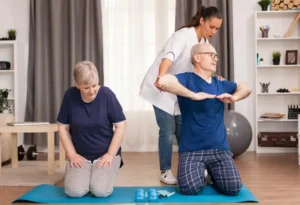We’ve all known helicopter parents. The ones whose children never do wrong. They hover around like helicopters, always ready to save the day should anything go awry. They press for special exceptions and save their kids from life’s little failures, such as a forgotten homework assignment, a lost baseball game or a test that was a little too challenging and in the process these parents create more problems because of their own unreasonable behavior.
I’ve noticed as I care for the elderly that there are also helicopter children! Adult children who hover around elderly parents, wanting to guard from every possible harm and hazard. Helicopter kids can be even more dangerous than helicopter parents. Elderly who aren’t allowed to do anything for themselves eventually cease to have the ability. Aging moms who are deprived of their own opinions and judgments end up frustrated. Worse, aging parents who behave in unhealthy ways as they try to grasp back control over life tend to make terrible choices that can throw families into heartbreaking upheaval.
Here are 3 ways to avoid becoming a helicopter kid as you care for your aging parents:
- Respect your parents’ right to risk. A crucial part of our assisted living approach involves treating residents as customers, not as patients. Conflict is inevitable as older people begin to lose control over life and abilities. Giving choices back to residents, even “risky” ones like cheating on a diet, or doing her own laundry, is a good way to diffuse the temptation the older person feels to go outside the prescribed safe boundaries. Often when a parent feels railroaded, he will dig in even deeper to be sure his rights are respected. Allowing a small “risk” to give a parent some element of control can often pay off in trade on the bigger issues.
- Realize your responsibility to think clearly. Caring for a parent often means the adult child must move from a subordinate capacity to a more authoritative position as decisions are made. Sometimes parents cling to unhealthy living situations or habits out of panic at the loss of control aging brings. Irrational thinking abounds as the aging adult grieves the loss of abilities and privileges she once enjoyed. Sometimes adult children must be the clear thinkers and gently but firmly make decisions to preserve safety when parents aren’t thinking clearly. In cases of dementia, parents need someone to think and remember for them. In order to do this, adult children must avoid getting trapped in emotional arguments and manipulations. We must often set aside pent up feelings or old habits of relating with our parents and stay in the moment while we do what is best for our parents.
- Rein in your expectations. Many adult children have sat in my office in tears, mourning a parent’s misery. I’ve often reminded those children that while they can provide safety, peace of mind, food, and medical care, the choice to be happy belongs to the parent alone. Watching someone you love go through grief and sadness is painful. It’s easy to panic and try to do something, anything, to relieve a loved one’s pain. One daughter wore herself out meeting her mother’s demands. When her mother only responded with more demands and no gratitude, the daughter’s heart was broken. Sometimes expectations, though reasonable, may not be realistic. Avoid a large amount of stress by adjusting your expectations. Mom may be too overwhelmed as she copes with her own feelings about aging and mortality and may be unable to be who she always was. Release yourself and your parent from unreachable expectations and experience a lot more joy.
By blurring the boundaries and obsessing over the children, helicopter parents create more stress for themselves and everyone around them. As an adult child, becoming a helicopter kid will only create additional stress for you and your parent. Try taking a more relaxed, reasonable approach to caring for your parent, one that allows your parent to be herself and you to have your own life. Reducing the tension in caregiving will lead to increased joy, and help you make the most of the precious time with your family.


